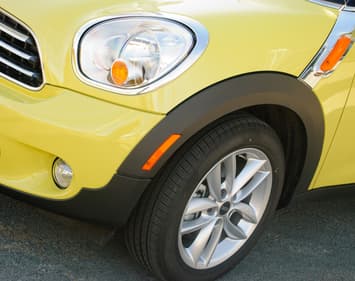Can I Use Smaller Tires on My Car
 While some drivers plus size their wheels or install taller tires for a big, bold look, other drivers may want to put smaller tires on their vehicle for cost or aesthetic reasons. Smaller tires may seem like a smart choice, but can your car or truck handle smaller tires? Learn about the pros and cons associated with putting smaller tires on your car or truck and why it's best to stick to your manufacturer's recommendations.
While some drivers plus size their wheels or install taller tires for a big, bold look, other drivers may want to put smaller tires on their vehicle for cost or aesthetic reasons. Smaller tires may seem like a smart choice, but can your car or truck handle smaller tires? Learn about the pros and cons associated with putting smaller tires on your car or truck and why it's best to stick to your manufacturer's recommendations.
Smaller Tires: What Are the Pros?
In certain cases, smaller tires can provide less sidewall roll when turning a sharp corner, offer better handling, improved traction, and allow more torque to be transmitted to the ground since the wheels are smaller in diameter.
Since smaller tires spin faster, they require higher engine RPMs than larger tires when driving at the same speed. Additionally, smaller tires may directionally provide more towing power than larger tires since they may transfer more of their torque to the ground, but the engine may spin faster and run hotter trying to stay at that speed.
Smaller tires can boost the aesthetic of your vehicle by lowering your car to the road. However, equipping your car or truck with smaller tires for aesthetic purposes may alter the performance of your vehicle. Before choosing smaller tires for your car or truck, stop by your local Firestone Complete Auto Care, and our tire experts will walk you through the best options for your vehicle based on the manufacturer's recommendations.
Smaller Tires: What Are the Cons?
Unless your vehicle's manufacturer specifies an option for smaller tires, making the change to smaller tires may not be in your best interest.
Making the change to smaller tires may require a lowering kit or springs, arms, brackets, stabilizing bars, and shocks. With all of these modifications, you may be looking at interference with your car's sensors and computers — plus, a hefty price tag.
Smaller tires can cause inaccurate information from your speedometer and odometer, create transmission shifting issues, cause anti-lock brakes to malfunction, and may even trip your check engine light. Smaller tires can also cause issues with the Advanced Driver Assistance Safety systems as well as issues with proper wheel alignment angles.
Smaller tires can make your vehicle ride lower, causing the vehicle to scrape, collide with, or bottom out on items that it should otherwise clear — think speed bumps, entrances into parking lots, rough intersections, and roadway debris.
Additionally, the added torque from smaller wheels could cause your tires to age and wear out sooner since they're rotating faster and engaging with the pavement more per mile than a manufacturer-recommended tire size would. Likewise, if the overall tire diameter remains the same but the rim size is smaller, you need to be careful to ensure vehicle hardware like brake rotors and calipers still have clearance so the wheel can rotate.
Can You Put Smaller Winter Tires On A Car?
To avoid the expense of winter tires — especially as manufacturer size recommendations can hit 19 inches or above — some drivers look to smaller winter tires to help improve cold-weather traction and driving safety. Unfortunately, the price of winter tires is not linear to the size of the tire. For instance, 16-inch tires may be more expensive than a common tire size of 17 inches.
If you're considering purchasing smaller winter tires to save money, you may run into similar issues as putting smaller non-winter tires on your vehicle. If you are looking to save money on winter tires, consider purchasing a quality pair of winter tires in your vehicle manufacturer's size recommendation that you can reuse for several winter seasons.
Get the Right Sized Tires from Firestone Complete Auto Care
Can you put smaller tires on a car? Perhaps. But should you? Probably not! While smaller tires can have some benefits, the risks of your vehicle's systems malfunctioning are something to consider. Following vehicle manufacturer recommendations leads to the best intended performance, handling, and safety results in your car — no matter if you're choosing new tires for a truck or a car.
If you're considering putting smaller tires on your vehicle, start by checking your owner's manual for manufacturer-backed recommendations. Then, head into your neighborhood Firestone Complete Auto Care for new tires with expert installation.
Browse our tires online by vehicle or tire size, then schedule an appointment with your local tire professionals for expert help in finding and installing the right tires on your vehicle. Our tire pros can help you select the right tires for your ride, budget, and lifestyle. Shop online or visit a store near you today!
Can I Use Smaller Tires on My Car
Source: https://www.firestonecompleteautocare.com/blog/tires/smaller-tires-on-car-or-truck/#:~:text=Since%20smaller%20tires%20spin%20faster,driving%20at%20the%20same%20speed.&text=However%2C%20equipping%20your%20car%20or,the%20performance%20of%20your%20vehicle.
0 Response to "Can I Use Smaller Tires on My Car"
Post a Comment